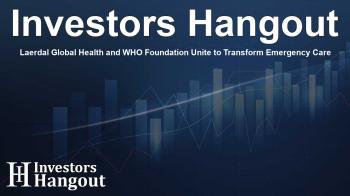Laerdal Global Health and WHO Foundation Unite to Transform Emergency Care

Transforming Emergency Care Through Partnership
Effective emergency care can save lives in low- and middle-income nations.
In a significant development, Laerdal Global Health has joined forces with the WHO Foundation to address urgent healthcare needs through a newly announced $12.5 million initiative aimed at enhancing acute care training for health workers in select regions.
Investment in Health Worker Training
During an event at the World Health Assembly, Laerdal Global Health founder, Tore Laerdal, along with WHO Foundation Chair Thomas Zeltner, unveiled their commitment to significantly escalate the training programs necessary for sustainable healthcare. This partnership emphasizes the critical role of emergency care in reducing preventable deaths and has the potential to bring transformative changes in available healthcare resources in various African nations.
Support and Implementation
This groundbreaking contribution will facilitate the training of professionals across 400 hospitals in three targeted countries, with specially developed training kits that enable ongoing education within the workplace. The partnership aspires to leverage additional resources through a newly formed consortium named Lifeline: The Acute Care Action Fund, projected to raise a total of $25 million to expand the program’s reach to 1,000 hospitals and save an estimated 50,000 lives each year.
The Basics of Emergency Care Program
Developed in collaboration with the International Committee of the Red Cross and the International Federation for Emergency Medicine, the Basic Emergency Care (BEC) program aims to educate health workers in fundamental emergency care skills. Since its initiation in 2016, it has successfully trained tens of thousands of healthcare professionals across over 60 different countries.
Impact of Previous Initiatives
Prior studies indicate remarkable advancements in first-level hospitals with reports showing reductions in mortality rates from acute conditions such as pneumonia, road accidents, diabetic crises, and postpartum complications by 34% to 50% post-BEC implementation. These figures clearly illustrate the effectiveness of the Basic Emergency Care initiative.
"The Basic Emergency Care program is crucial for reducing mortality rates from acute health emergencies by up to 50 percent," remarked Tore Laerdal. His commitment underscores the vitality of tailored, evidence-based training programs that adapt to local needs.
Bruce Aylward from the WHO Directorate highlighted the importance of sustaining health systems and the need for health workers who can provide efficient acute care, advocating that this initiative is essential for achieving universal health coverage.
He continues, "We recognize that funding for such essential programs is vital, particularly in times of limited resources. This collaborative effort will be crucial for advancing global health outcomes moving forward."
A Call for Further Support
As the WHO Foundation continues its mission, Thomas Zeltner insists, "This generous contribution from Laerdal Global Health presents a unique opportunity to bolster WHO's efforts at a crucial juncture in global health funding."
Moreover, both organizations are keen to engage other potential partners and invite them to join in supporting the Lifeline: The Acute Care Action Fund, which aims to extend the reach of the BEC program beyond current bounds, focusing also on humanitarian crises.
About Laerdal Global Health
Laerdal Global Health stands as a non-profit entity dedicated to saving lives in under-resourced environments. By developing straightforward, scalable, and locally adaptable healthcare training solutions, they aim to improve health outcomes for mothers, newborns, and individuals affected by emergency medical conditions.
The organization works alongside governments and local partners to empower frontline workers, equipping them with the necessary skills and resources to impact patient care positively. This vision aligns with the broader Laerdal mission to save one million more lives annually by 2030.
About the WHO Foundation
The WHO Foundation operates from its headquarters in Geneva, facilitating independent grant-making initiatives that bolster the World Health Organization’s goals. Their focus is on mobilizing resources and forging catalytic partnerships to tackle pressing health challenges, specifically targeting vulnerable communities worldwide.
Frequently Asked Questions
What is the purpose of the $12.5 million funding?
The funding aims to enhance training for health workers in acute care across selected African countries, helping save lives.
What does the Basic Emergency Care program entail?
The program trains healthcare professionals in essential emergency care skills to improve health outcomes in their communities.
How many hospitals will benefit from this initiative?
Initially, 400 hospitals will receive training, with the aim to scale up to 1,000 hospitals with additional funding.
Why is this partnership crucial now?
In the current landscape of limited health funding, strengthening basic emergency care is vital to reduce preventable deaths.
How can others contribute to this effort?
Other organizations and individuals are encouraged to join the Lifeline: The Acute Care Action Fund to broaden the scale of the BEC program.
About The Author
Contact Hannah Lewis privately here. Or send an email with ATTN: Hannah Lewis as the subject to contact@investorshangout.com.
About Investors Hangout
Investors Hangout is a leading online stock forum for financial discussion and learning, offering a wide range of free tools and resources. It draws in traders of all levels, who exchange market knowledge, investigate trading tactics, and keep an eye on industry developments in real time. Featuring financial articles, stock message boards, quotes, charts, company profiles, and live news updates. Through cooperative learning and a wealth of informational resources, it helps users from novices creating their first portfolios to experts honing their techniques. Join Investors Hangout today: https://investorshangout.com/
The content of this article is based on factual, publicly available information and does not represent legal, financial, or investment advice. Investors Hangout does not offer financial advice, and the author is not a licensed financial advisor. Consult a qualified advisor before making any financial or investment decisions based on this article. This article should not be considered advice to purchase, sell, or hold any securities or other investments. If any of the material provided here is inaccurate, please contact us for corrections.

